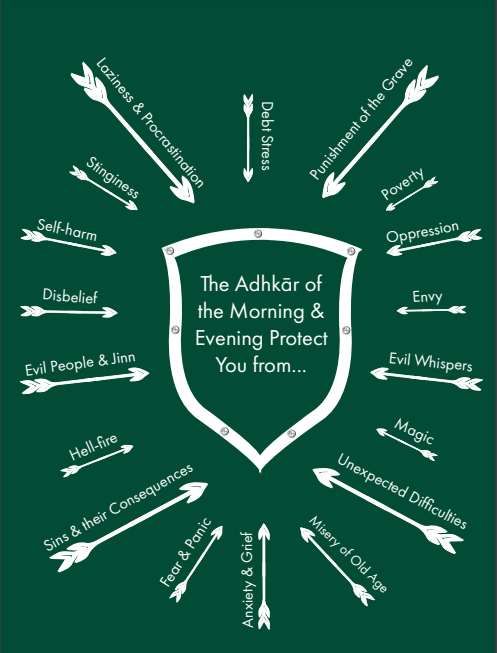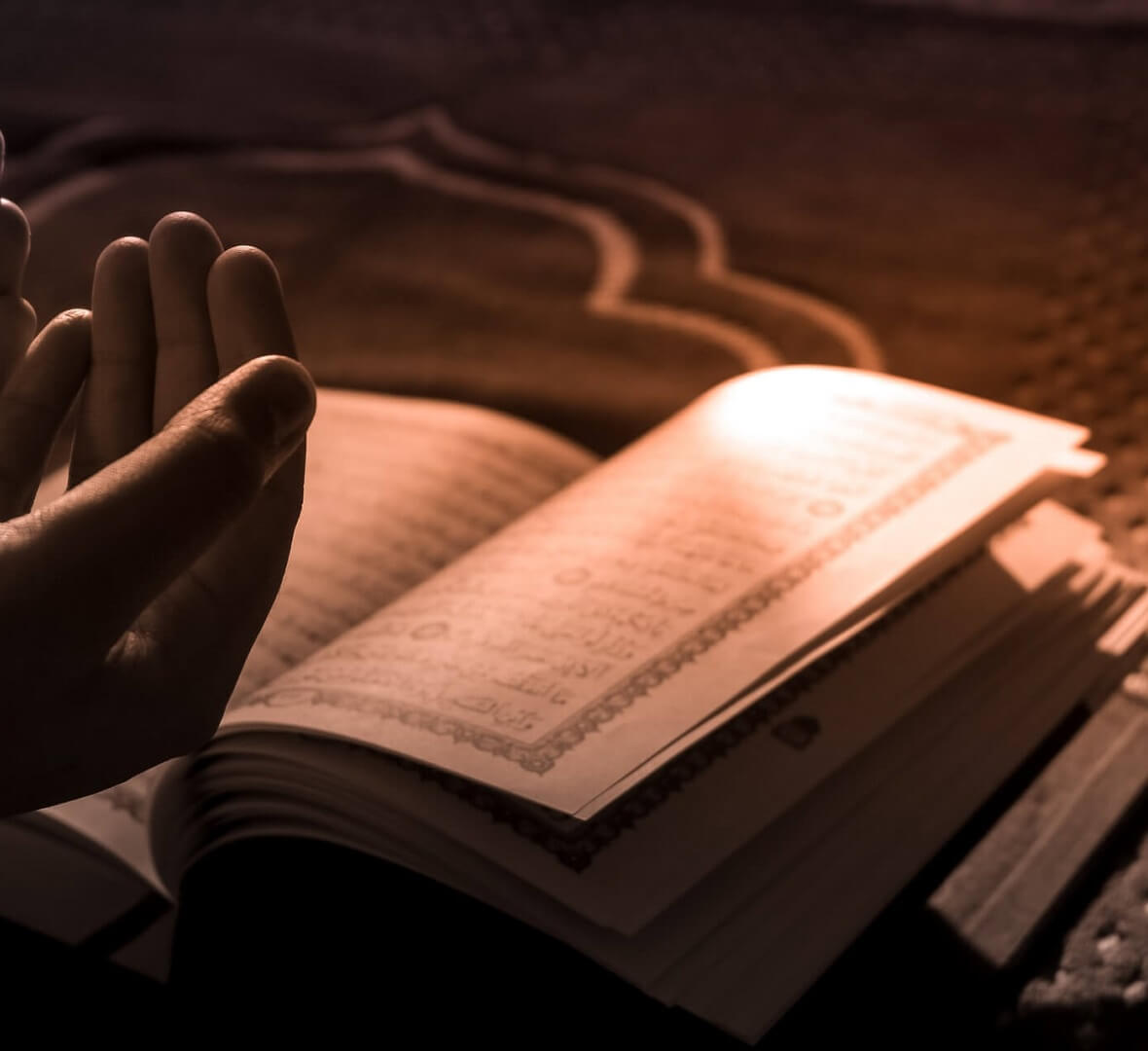‘And remember Allah often so you may triumph.’ (Surah Al-Anfal, 8:45)
Adhkar is the plural of dhikr. Dhikr is the remembrance of Allah SWT. Adhkar is a series of invocations uttered for the remembrance of Allah SWT that has been prescribed by our beloved Prophet Muhammad SAW. Therefore, the recitation of Adhkar is an integral part of the Sunnah of the Prophet SAW.
It is reported,
“The Prophet SAW was asked, ‘Which deed is more virtuous?’
“He SAW answered, ‘To depart with one’s tongue preoccupied with the remembrance of Allah SWT.’”
What is meant by the remembrance of Allah SWT? It is a way of journeying towards Allah SWT, reigniting our connection with our Rabb, our creator, and recognizing our undeniable reliance on Him. Dhikr ensures that our hearts are bound to Him and opens our hearts to His love and light.
Journeying Towards Allah SWT
There are many ways to journey towards Allah SWT.
The performance of Salah is the primary, most complete, and wholesome way to achieve this because it engages every aspect of the human being. Mental, physical, emotional, and spiritual. It also incorporates all the other aspects of the journey-Quran, dhikr, and dua- throughout the sequence of the prayer.
Recitation of the Quran is a means of engaging with Allah SWT’s words. Whenever one seeks advice or answers to questions, recitation is always beneficial as the Quran has always an answer and makes one ponder.
Dhikr is the remembrance of Allah SWT through praising and glorifying him and showing gratitude. It can also include forms of Dua. By praising Allah SWT we come to the realization of His Magnificence and Might and our Tawhid, or our belief in the Oneness of Allah SWT, is reaffirmed.
Dua is the means through which all our requests may be put forward to Allah SWT. Through our awareness of Allah’s Might and Power, we humble ourselves and accept that He is our Only Provider.
In all these forms, there is an active engagement with Allah SWT, be it through glorification, gratitude, seeking help, or searching for answers. With the consistent performance of these, we are surely capable of achieving closeness to our Rabb that cannot be achieved otherwise.
Check out the list of morning and evening Adhkar (prescribed supplications by our beloved Prophet Muhammad SAWS).
Prescribed Times for Adhkar
Specific times for the remembrance of Allah SWT have been mentioned in the Quran and Hadith as being more virtuous than other times of the day. These include the morning, the evening, and part of the night.
Allah SWT says in Quran 76:25-26:
“˹Always˺ remember the Name of your Lord morning and evening,
and prostrate before Him during part of the night, and glorify Him long at night.”
We could infer that remembering the Name of Allah morning and evening and glorifying Him at night are forms of Dhikr while prostrating at night would include prayers such as Qiyamul Layil or Tahajjud. So Dhikr has been prescribed as an act to be performed in the morning, evening, and night specifically. There is something special about these periods of time that Allah SWT says brings mankind contentment through the remembrance of Him.
So be patient ˹O Prophet˺ with what they say. And glorify the praises of your Lord before sunrise and before sunset, and glorify Him in the hours of the night and at both ends of the day, so that you may be pleased ˹with the reward˺. (Quran 20:130)
This article focuses on the morning and evening Adhkar primarily because in the Quran, Allah SWT has mentioned the remembrance of Him in the morning and evening in 15 different places giving it much importance.
Says Quran 33:41-42:
“Believers, remember Allah often and glorify Him morning and evening.”
Also, Quran 7:205
Remember your Lord inwardly with humility and reverence and in a moderate tone of voice, both morning and evening. And do not be one of the heedless.
And many more such as this.
Let us elaborate on the specified times for Adhkar.
The morning consists of the time after Fajr Salah until sunrise and an extended time up to 15 minutes before Dhuhar Salah.
The evening consists of the time after Asr Salah until sunset.
What is the significance of morning and evening? There is much wisdom behind the times for Adhkar. We are aware that all of creation is in a constant state of glorification of Allah SWT, and this is no exception for man. The times of Adhkar are when Salah is not performed. There is a considerable gap between Fajr and Dhuhar for example. Therefore, Adhkar fills the void and replaces the lack of a Salah ensuring that man’s connection with Allah SWT is never lost. https://www.youtube.com/watch?v=VUhHhBGC2p0
See Quran 38: 18-19, in which Allah SWT talks about all of creation is in a state of praise to Him, even the inanimate objects such as mountains.
We truly subjected the mountains to hymn ˹Our praises˺ along with him in the evening and after sunrise.
And ˹We subjected˺ the birds, flocking together. All turned to him ˹echoing his hymns˺.
Subhanallah!! Is this not a mercy to mankind from Allah SWT that He ensures that the doors of communication to Him are always open to Us? Yet, do we really utilize this blessing to our benefit?
Further, the morning and evening are considered the two ‘cool periods’. During the morning and evening, the universe is in transition. Day turns into night and nights turn into day. And they are periods where man is a witness to the Magnificence of Allah SWT’s power. The heart is at its most responsive and reflective state making these hours perfect for dhikr. (Daily Adhkar, 2017:49, Ummah Welfare Trust).
The relevance of the times of dhikr is in relation to the times of Fajr and Asr. As several scholars have elucidated (for example https://www.youtube.com/watch?v=BHgRXnpY4Bk) Fajr and Asr are the times when angels appointed as guardians for every slave, change shifts. When one set of angels descends, the other set prepares to leave. And at some period during these two times, as the shift takes place, both sets of angels are present recording one’s actions. All prayers and recitations are recorded twice by both sets of angels during these times. So when Allah questions the angel as to how they left His slave, they would respond that they left him in a state of prayer. Scholars state that angels should always ascend and descend while man is in a state of prayer so that Allah is always being informed of one’s consistency in the performance of prayer.
Benefits of the Morning And Evening Adhkar
The benefits are many…
- Establishing closeness and love for Allah. In one of the most famous hadith the Prophet SAW said: “Allah the Exalted and Transcendent states: ‘I am near to the thoughts of my bondsman (servant) as he thinks about Me. And if he remembers Me in his heart, I also Remember him in My Heart; and if he remembers Me in an assembly, I Remember him in a better Assembly; and if he draws near to Me by the span of a palm, I draw near to him by a cubit; and if he draws near to Me by a cubit, I draw near to him by the space of two hands (outstretched hands); and if he walks towards Me, I will rush (run) towards him”. (Bukhārī, Muslim, Tirmidhī and Ibn Māja ). Therefore, Adhkar propels one towards a spiritual ascension towards Allah SWT while affirming and reaffirming Tawhid on a continuous basis.
- Contentment – As mentioned earlier (Quran 20:130), Allah SWT Himself notes that remembrance brings contentment to the hearts of man. When consistently done, despite the troubles and afflictions faced, man always exemplifies a sense of peace within him.
- Healing – Recitation of daily Adhkar results in the purification of the body and the heart, from all forms of illness bringing the body into balance or homeostasis. (Professor Ghoesain Mohamed in Al Wird Al Latif, by Imam ‘Abdullah Ibn ‘Alawi Al-Haddad). It has been proven time and again to remove depression and anxiety while strengthening and purifying the heart.
- Expiation of Sins – Al Nawawi Rahimahullah notes that in the morning and evening, Adhkar expiates the sins perpetrated between the two periods.
- Protection -Ibn Al Qayyim Rahimahullah has stated that the two sets of Adhkar act as a shield for protection for man. An invisible shield that protects man from various evil and negative forces.
“The thicker it is the more will be protected. Rather, its strength can reach to such an extent that the arrow shot at it will bounce back to affect the one who shot it.”
Ibn Kathir Rahimahullah also notes that the ‘coat’ of Adhkar protects from the evil of mankind and jinn and ‘covers the souls with istighfar’ wiping out the sins amassed in the day and night (Al-Waabil al-Sayyib).
In the book Daily Adhkar, this idea is captured quite well through the following image (2017:72)

- Salvation from the punishment of the hereafter – According to Sahih Bukhari whosoever preserves the prayers of these times will enter paradise. Ibn Rajab in ‘Al-Mahajjah Fi Sayr al-Duljah (Journey to Allah), the morning and the evening obligatory and optional prayers will avail the believer a position amongst the elite of Paradise.
- A Source of sustenance to the body and soul- Sheikh Al-Islam Ibn Taimiyyah Rahimahullah has said that “The remembrance of Allah is like water to the fish. What would happen to the fish if it were separated from the water?”
The Etiquettes of Adhkar
Already mentioned in a Quranic verse quoted above (7:205) Allah SWT commands us to remember Him ‘inwardly’ with ‘humility’ and ‘reverence’ in a ‘moderate tone of voice’, ‘in the morning and evening’. So here, we are already being given several instructions by Almighty Allah Himself. Let us elaborate:
- First, ensure that the Adhkar is recited at the specified times, before sunrise and before sunset. However, if one should miss these times then they should attempt to do it as soon as possible. That is better than avoiding it altogether. According to Tafsir Marif-ul Quran, mornings and evenings could mean at the beginning and end of the day, implying that one is in a constant state of dhikr. According to Aisha R.A, the Holy Prophet ﷺ was devoted to the remembrance of Allah at all times and under all conditions.
- Reciting inwardly is to be in connection with what one is reciting and to do so with sincerity. According to Tafsir Marif-ul-Quran, reciting inwardly could be of three kinds. Al-dhikr-al-khafiyy (Dhikr of the heart) is when one does not move the tongue and only thinks of Allah SWT and His attributes in his heart. The second kind is when the tongue is in alignment with what is happening in the deep recesses of his heart. Finally, the third kind and the most preferred is to be completely present in his heart and then, verbalize it too so there is the movement of the tongue and use of voice.
- Reciting in a lowered voice is preferred to reciting it loudly. The etiquette demands that one “should not do it too loudly reaching the outer limits of shouting and screaming” as this is a sign of disrespect. (Tafsir Marif-ul-Quran).
- The show of humility. The verse requires that we make dhikr humbly with the realization that Allah SWT is the Greatest and Most Exalted and we are in a state of praising and glorifying these attributes of Him.
- Dhikr has to be performed in a subdued manner in recognition of a feeling of awe and fear (khifa). In awe of Allah SWT’s Greatness and control over everything and in fear of our inability to do justice in worshipping Allah, fear of our sins and Allah’s punishment.
- Imam Ghazali mentions that one should supplicate with full belief that their prayers will be answered
- Facing the Qibla
In an article published on seekersguidance on the topic What is the Etiquette of Dhikr, it has been noted that:
- Being in a state of wudu is not necessary but preferred
- Covering the awrah for a woman as she would in prayer is not obligatory but preferred
- Completing one’s litanies in one sitting is not compulsory but preferred
Finally, it is more virtuous to recite all of the prescribed prayers of the Prophet Muhammad SAW to reap maximum benefit.


